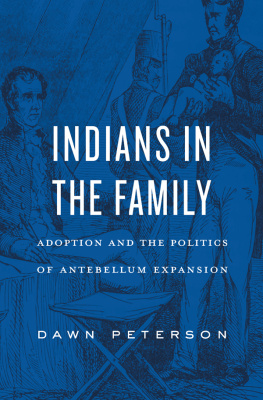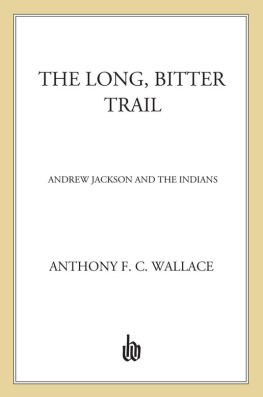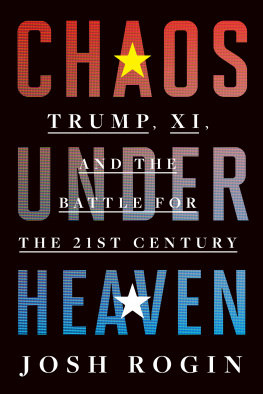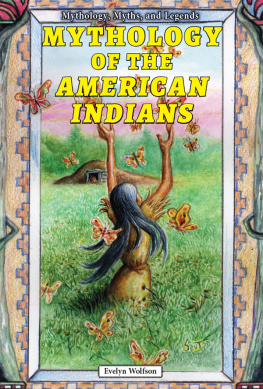Fathers and Children
Fathers and Children
Andrew Jackson and the Subjugation of the American Indian
Michael Paul Rogin
With a New Introduction by the Author
Originally published 1975 by Alfred Knopf, Inc.
Published 1991 Transaction Publishers
Published 2017 by Routledge
2 Park Square, Milton Park, Abingdon, Oxon OX14 4RN
711 Third Avenue, New York, NY 10017, USA
Routledge is an imprint of the Taylor & Francis Group, an informa business
Copyright 1991 by Taylor & Francis.
Copyright 1975 by Michael Paul Rogin.
All rights reserved. No part of this book may be reprinted or reproduced or utilised in any form or by any electronic, mechanical, or other means, now known or hereafter invented, including photocopying and recording, or in any information storage or retrieval system, without permission in writing from the publishers.
Notice:
Product or corporate names may be trademarks or registered trademarks, and are used only for identification and explanation without intent to infringe.
Library of Congress Catalog Number: 90-11309
Library of Congress Cataloging-in-Publication Data
Rogin, Michael Paul.
Fathers and children: Andrew Jackson and the subjugation of the American
Indian / Michael Paul Rogin; with a new introduction by the author.
p. cm
Reprint. Originally published: New York: Knopf, 1975.
Includes bibliographical references (p. ) and index.
ISBN 0-88738-886-8
1. Indians of North AmericaGovernment relations1789-1869.
2. Jackson, Andrew, 1767-1845. 3. Indians of North AmericaLand transfers. I. Title.
[E93.R8 1991]90190-11309
937.0497dc20CIP
ISBN-13: 978-0-8873-8886-6 (pbk)
Publishers Note
The publisher has gone to great lengths to ensure the quality of this book but points out that some imperfections from the original may be apparent.
TO DEBORAH
Thou just Spirit of Equality, which hast spread one royal mantle of humanity over all my kind! Bear me out in it, thou great democratic God!... Thou who didst pick up Andrew Jackson from the pebbles; who didst hurl him upon a war-horse; who didst thunder him higher than a throne! Thou who, in all Thy mighty, earthly marchings, ever cullest Thy selectest champions from the kingly commons; bear me out in it, O God!
Herman Melville, Moby Dick
Norman Jacobson, Louis Hartz, and Leslie Fiedler provided models for my understanding of American politics and culture. I have also received an invaluable education from the students at Berkeley; among the many to whom 1 am indebted, Greil Marcus, Pat ODonnell, Bruce Parker, and Margaret Samuelson each decisively influenced interpretations made here. Dr. Jules Weiss seminar at the San Francisco Psychoanalytic Institute helped me understand psychoanalytic biography. Richard Busacca, James C. Curtis, Frederick Crews, J. David Greenstone, Hanna Fenichel Pit kin, Paul Roazen, Charles G. Sellers, Jr., Michael N. Shute, Henry Nash Smith, Ronald T. Takaki, and Mary E. Young made helpful comments on varying versions of the manuscript. Mary Youngs encouragement at an early stage was particularly important. I am also grateful to Ashbel Green at Knopf for his good judgment and care.
Mark Gross, Mark Morris, and Joel Schwartz helped me on different occasions with special research tasks. The Committee on Research at the University of California at Berkeley paid for their time, and for other substantial research expenses. The staffs at the National Archives and the Tennessee State Library and Archives directed me to important documents. A fellowship from the John Simon Guggenheim Memorial Foundation provided a year free to write. Francesca Archer contributed a superb job of typing.
My wife, Deborah Donohue Rogin, played an indispensable role in the development of this book. Her insights have had fundamental impact on my work.
The Donelson family tree is complete only for the second generation. Corresponding superscript numbers indicate intermarriages.
I
The development of a capitalist world system in the sixteenth and seventeenth centuries brought Europeans into large-scale, exploitative relationships with peoples of color in Africa and the new world. Isolated medieval wild men, imagined as fairly harmless creatures of unbridled animal violence and desire, now seemed to be found together in a state of nature. They lived, in the European imagination, without family, government, or religion, in some combination of Edenic naked harmony and incest, cannibalism, and murder.
From one point of view, these savages stood at the furthest remove from European civilization. True, the line of separation was not merely color. Internal feudal breakdown accompanied external expansion, and savages were emerging at home, too. The discovery of peasant low cultures, the appearance of vagabonds and masterless men, the witchcraft craze, the effort to discipline chaotic inner states, the Protestant destruction of religious images and the Catholic moralization of them all share similarities with the invention of the savage. By the eighteenth century, philosophes had developed a systematic notion of the primitive mind, negative of the rational, enlightenment consciousness, and located it in savages, peasants, children, and lunatics. By the nineteenth century, workers had become savages, too. Nevertheless, primitivism had its greatest continuing force as applied against peoples of color. It developed into a full-blown, racialist theory during the nineteenth century, deriving national identity from racial superiority and justifying on racialist grounds the right of one group to exploit, displace, and exterminate another. Primitivism reached fulfillment at the dawn of the twentieth century, in Euro-American imperialism abroad and in domestic relations with Asian, African, Latin, and native Americans inside the United States.
The idea of savagery was partly an exercise in cultural distancing. Christian and Enlightenment assertions of common humanity were born twinned, by way of infidels and savages, with their own self-denial. The divisions between saved and damned, civilized and savage, generated by the mid-nineteenth century the scientific doctrine of separately created hierarchical, racial species. At the same time, however, the theory and practice of primitivism brought so-called savages into intimate connection with civilized human beings. Primitivism promoted continuing exploitative relationships in which, to borrow from Octave Mannoni, the Calibans served psychic as well as material functions for the Prosperos. The mixture of distance and intimate bond is suggested both in liberal, social contract philosophy, which cited the example of American Indians to postulate an original state of nature for Europeans; and in evolutionary theories, which made primitivism an early stage of civilization, with primitives as both the ancestors of the civilized and as the children they had outgrown and would paternally protect The rejection of contractual and evolutionary doctrines in the course of the nineteenth century, in favor of competition for the survival of the fittest among separate and distinct racial species, widened the gap between savagery and civilization. But the doctrine of racial separation, far from acknowledging the genuine cultural differences elided in contractual and evolutionary theory, pointed instead to an increasingly destructive symbiosis between civilized and savage. The idea of savagery, throughout its vicissitudes, was an instrument in the formation of civilized identity. In Mannonis formulation, mature, independent civilized men desired relations of corrective superiority to primitives, participating through identification with them in longings for a lost paradise. The conflict between civilized and savage created new, revitalized national identities, bringing forth, in Richard Slotkins phrase about the United States, regeneration through violence.










